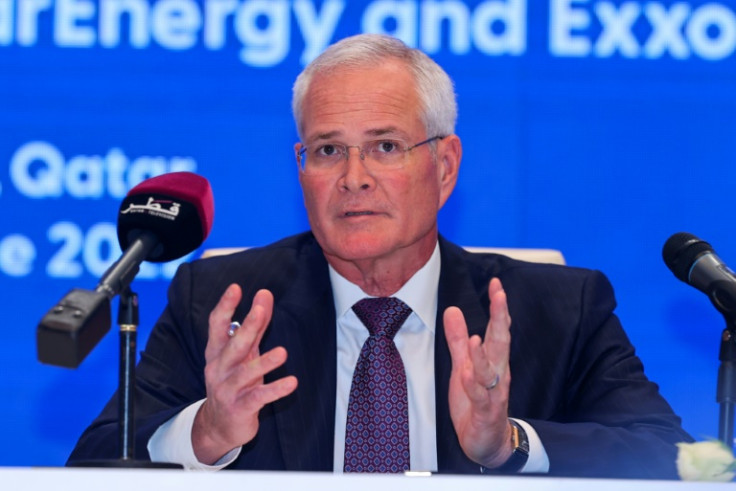Big Oil Juggles Major Investments In Renewable Energy And Fossil Fuels

ExxonMobil announced a breakthrough in its clean energy division last week: It had successfully drilled its first lithium well at the company's facility in southern Arkansas and now plans to be a "leading supplier for electric vehicles by 2030."
The following day, the ExxonMobil newsroom had a new headline report: The company had opened a third offshore oil facility in Guyana, increasing its output of oil and gas in the small South American country by more than 50%.
These pendular press reports are a microcosm of the dilemma facing the world's largest oil and gas companies as they manage the global transition to green and renewable energy sources.
ExxonMobil and the other major oil companies comprising the "Big Six" are hedging their deeply ingrained investments in fossil fuel production with significant investments in renewable energy systems—including lithium batteries, wind farms and solar plants.
Experts have speculated for years as to whether "big oil" will eventually transition its business model away from oil and gas production and towards the production of renewable energy.
Recent evidence suggests that while this transition may be underway, there is still a long road ahead, as major multinational energy companies continue to make substantial long-term commitments to fossil fuels.
International Business Times received comments from ExxonMobil, British Petroleum (BP), and Shell for this article.
Oil Companies Hedge Their Bets
The large pool of capital and skilled labor at the oil and gas industry's disposal makes the oil majors prime candidates for rapidly executing large, capital-intensive projects critical to the renewable energy transition—such as mining underground lithium-rich brines and building offshore wind farms.
ExxonMobil alluded to this in its press release last week, stating, "This landmark project applies decades of ExxonMobil expertise to unlock vast supplies of North American lithium." Its Arkansas project aims to produce 100,000 tons per year of battery-grade lithium by 2030, which would make the U.S. the world's third-largest lithium-producing country relative to 2022 data.
ExxonMobil is not the only oil major making substantial investments in energy technologies widely viewed as detrimental to the long-term economic viability of fossil fuels.
Shell has been involved in offshore wind farm projects for decades and has been joined in recent years by other major oil companies making multibillion-dollar investments in offshore wind, including BP, Chevron, Norwegian state-owned Equinor and Brazilian state-owned Petrobras.
Carbon capture and storage (CCS) has also been a primary focal point of major oil and gas companies' decarbonization strategies, accounting for a sizable portion of most oil companies' net-zero budget.
CCS aims to capture and store emitted carbon underground as a means of offsetting emissions from the burning of fossil fuels. Its implementation has received criticism over concerns that the technology will lengthen the lifespan of fossil fuel energy systems.
"We believe widespread deployment of carbon management technologies such as carbon capture and storage is significant," Shell's media relations team told IBT on Monday. Shell's carbon capture spending rose by 51% between 2021 and 2022.
The Scope Of Big Oil's Renewable Footprint
All six of the oil majors have committed to net-zero emissions, both directly and indirectly caused by their operations, by 2050. Each oil company has a different strategy for reaching this goal.
A representative from ExxonMobil shared the following with IBT on Tuesday: "ExxonMobil is investing $17B through 2027 on lower-emission initiatives and has built an entire business—Lower Carbon Solutions—dedicated to this. With Lower Carbon Solutions, we're focused on the hard-to-decarbonize sectors, which include transportation, manufacturing, and power generation."

The figure of $17 billion cumulative investment in low-emission technologies through 2027, while representative of ExxonMobil's largest commitment to renewable energy to date, is far less than than the company's recent investments in fossil fuels. In October, ExxonMobil acquired Pioneer Resources, a Texas-based upstream oil and gas company with holdings in the Permian Basin, for a reported purchase price of $59.5 billion.
ExxonMobil's $17 billion commitment over a five-year period includes an undisclosed mix of emission reduction measures, not necessarily concentrated in the development of newer, non-fossil fuel energy systems.
Shell has pledged a greater commitment in the near term. The company told IBT it will invest between $10-15 billion from 2023-2025 in "low-carbon energy solutions, including biofuels, hydrogen, electric vehicle charging, and carbon capture and storage."
BP's stated renewable energy commitment is the most significant of the three companies that provided comments for this article. The company has committed $55-65 billion in total investment in "renewables, bioenergy, EV charging, hydrogen, and convenience" by 2030, at which point the company expects non-fossil fuel operations to account for 50% of total capital expenditures.
BP also aims "to be net zero by 2050 across production, operations, and sales," it says. "We believe we're unique among our peers in aiming for net zero sales," a company representative told IBT.
Financial Realities Take Hold
Despite considerable growth in recent years of major oil companies' investments in green energy, the International Energy Agency (IEA) projects oil and gas companies will spend north of $500 billion in new fossil fuel investments in 2023. This estimate was made in May, before ExxonMobil and Chevron completed high-profile acquisitions of other oil and gas companies valued at over $50 billion each.
And judging from their statements, oil majors' transition to renewable energy will not take place until the appropriate regulatory incentives exist.
"Shell intends to take a disciplined approach in pursuing carbon management technology and projects, keeping a clear line of sight to profitable returns and the emergence of supportive regulatory policies in wider markets," the company told IBT.
Oil and gas remain more stable and profitable investments for the world's major energy companies than renewable energy, a reality highlighted by a string of cancellations in recent months of offshore wind projects in the U.S. and Europe.
ExxonMobil posted profits of $19.7 billion in the third quarter of 2023, for example—still a relative decline of 54% from the prior year.
The IEA projects peak global demand for fossil fuel products by 2030 but still predicts global oil production to increase through the 2020s. 2023 will see a record level of global oil output, according to the IEA, driven largely by production increases in the U.S.
"Big oil" may eventually play a critical role in executing the green energy transition, but it certainly isn't expected to make the wholesale switch to renewable power on its own—not as long as there are still reliable profits to be made from fossil fuels.
© Copyright IBTimes 2025. All rights reserved.






















